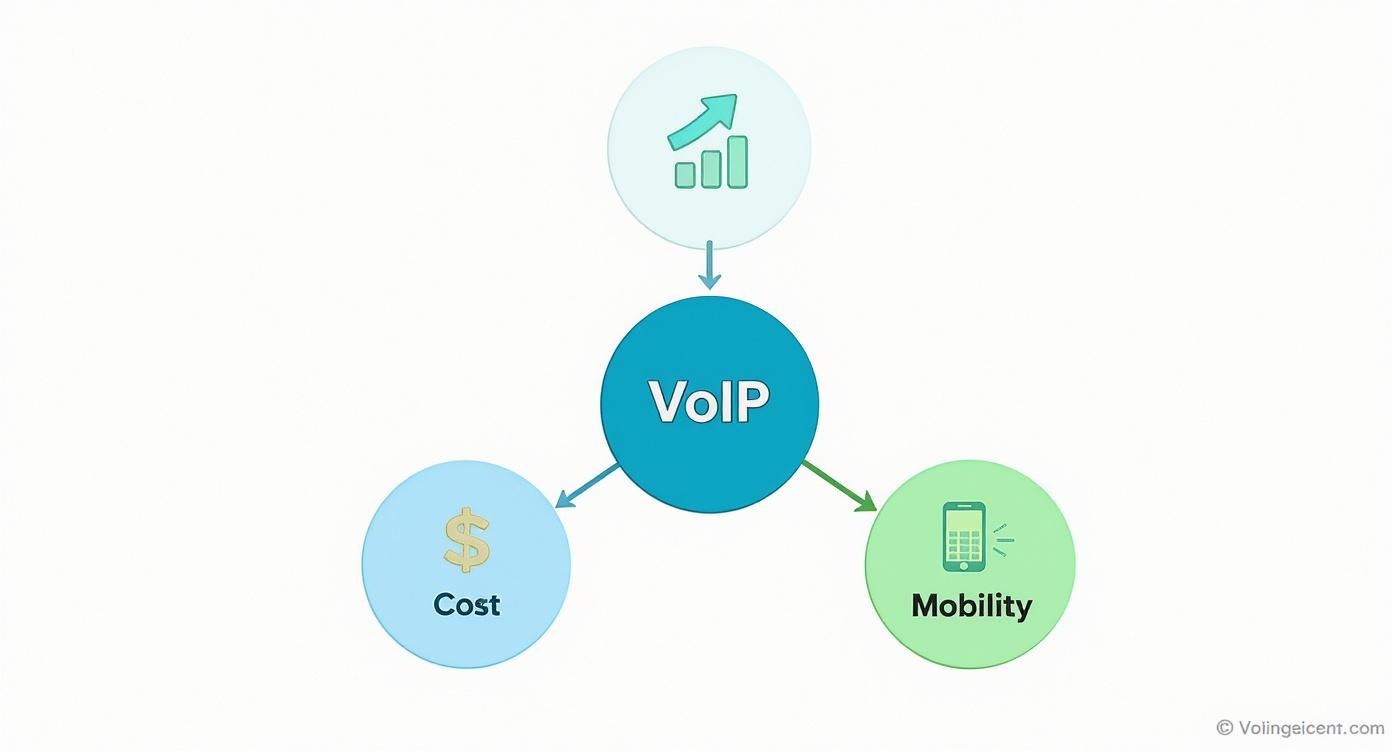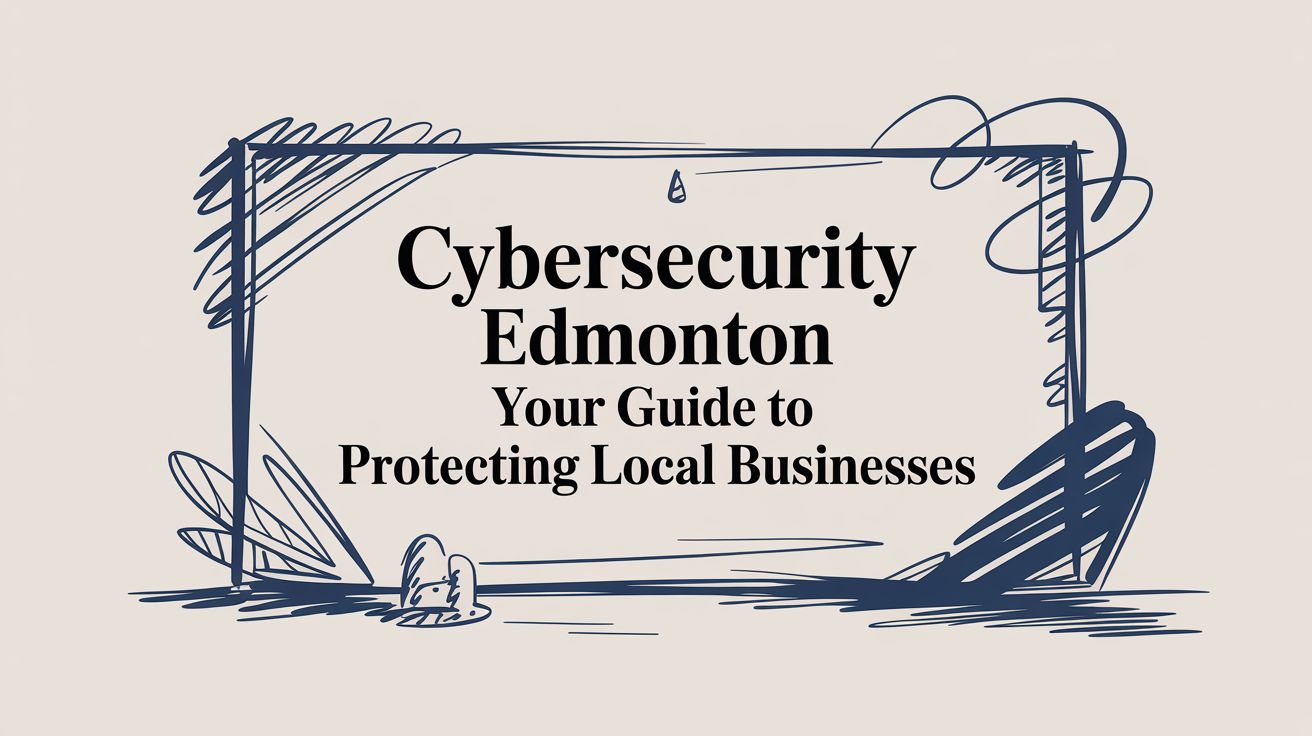
February 11, 2026
A Business Leader's Guide to Backup and Disaster Recovery in EdmontonProtect data and minimize downtime with proven backup and disaster recovery Edmonton strategies for a resilient business.
Read Full Post%20(1).webp)
Usman Malik
Chief Executive Officer
November 13, 2025

Is your outdated phone system struggling to keep up with the demands of a modern, flexible workforce? If you're dealing with high costs and a rigid setup, you're not alone. For many Canadian business and IT leaders, traditional phone systems are a significant operational bottleneck.
The solution is Voice over Internet Protocol (VoIP). This technology isn't just a minor upgrade; it's a strategic shift that transforms your business communications from a necessary expense into a powerful asset for growth and efficiency. This guide will walk you through the tangible benefits, critical compliance considerations, and key features of VoIP services in Canada, providing the insights you need to make an informed decision.
Imagine your business phone system functioning with the same flexibility as your email—always accessible, from any device, anywhere with an internet connection. That's the core promise of VoIP.
It works by converting voice into a digital signal that travels over the internet, completely eliminating the need for expensive, office-bound copper phone lines. This is more than a technical improvement; it's an essential adaptation to the new reality of how we work. The rise of remote and hybrid models has starkly revealed the limitations of legacy phone systems, which were never designed for a distributed team. VoIP provides the agility modern Canadian organizations need to stay connected and maintain a professional presence, regardless of where their employees are located.
With older platforms like Skype for Business now retired, businesses are actively seeking reliable, future-proof alternatives. If this challenge resonates with you, our insights on the Skype for Business retirement can help guide your next steps.

For decades, the standard was the traditional Private Branch Exchange (PBX)—that bulky hardware humming away in a server closet. These systems were notoriously expensive to purchase, complex to install, and costly to maintain.
Worse, they were incredibly inflexible. Adding a new line or changing an extension often required a service call from a technician. For any growing medium-sized business, this rigid setup creates significant challenges:
VoIP services in Canada address these issues directly by moving your entire phone system to the cloud. It transforms your phone from a simple utility into a comprehensive communications hub.
By leveraging the internet connection you already have, VoIP delivers exceptional flexibility, a richer feature set, and significant cost savings. It frees your business from the constraints of physical hardware and empowers your team to connect and collaborate from anywhere.
Let's move beyond the jargon and discuss the tangible advantages VoIP brings to Canadian businesses—the kind that directly impact your bottom line and operational agility. The most immediate benefit is often a dramatic reduction in costs. By eliminating traditional phone line subscriptions and minimizing long-distance charges, most organizations see significant savings right from the start.
This is particularly true for companies with clients or teams across the country or internationally. Imagine no longer watching the clock on a call to Vancouver or London. Many VoIP plans include nationwide calling and offer competitive international rates, making your monthly communications budget predictable.
Business needs are rarely static. You may need to add staff for a seasonal rush or scale back during a quieter period. With legacy phone systems, adding or removing lines is a slow, expensive process involving a technician's visit.
VoIP completely changes this dynamic.
Because your phone system is managed via software in the cloud, you can add or remove users with just a few clicks. This on-demand scalability means you only pay for what you need, when you need it, providing incredible flexibility to adapt to market changes.
In today's business environment, being tied to a desk is impractical. VoIP empowers your team with genuine mobility, allowing them to use their single business phone number on any device, anywhere with an internet connection.
Whether an employee is working from home on a laptop, using a smartphone on the road, or at a client site, they remain seamlessly connected to your company's phone system. This ensures a consistent, professional image, as every outbound call displays your main business number, not a personal one. This flexibility is a cornerstone of modern business operations.
Not long ago, advanced communication tools were exclusive to large corporations with deep pockets. VoIP levels the playing field, making enterprise-grade features accessible and affordable for medium-sized organizations.
The shift to cloud-based solutions is the new standard. Hosted and cloud PBX services now account for 52.3% of global revenue and are growing at 12.8% annually. For Canadian businesses, this trend presents a massive opportunity to adopt powerful tools without a heavy upfront investment. You can learn more about these global VoIP market trends and their implications for companies here.
These powerful features help you project a more professional image and deliver exceptional customer service. Key functionalities now within reach include:
When adopting new technology, particularly one that handles your organization's primary line of communication, understanding local regulations is paramount. For any business using VoIP services in Canada, this extends beyond comparing features and pricing. You must ensure your provider meets our country's strict standards for emergency services, data privacy, and overall security.
This is not just a compliance exercise; it is fundamental to building trust with your clients and protecting your organization from significant risks.
This map provides a quick visual of the core benefits of VoIP, illustrating how cost, growth, and mobility are interconnected.

As you can see, while cost savings often drive initial interest, the true power of VoIP lies in leveraging its mobility and scalability to foster sustainable growth. However, these benefits are only meaningful if they are built on a solid foundation of security and compliance.
One of the most critical compliance components for VoIP in Canada is Enhanced 911 (E911). Unlike traditional landlines tied to a physical address, VoIP's flexibility means an employee could be calling from their office, home, or a location across the country.
Because of this, Canadian regulations mandate that VoIP providers have a reliable system to route emergency calls to the correct Public Safety Answering Point (PSAP) and provide the caller's location to dispatchers.
Your provider must offer a straightforward way to register and update the physical address associated with each phone number. When someone dials 911, that registered address is automatically sent to an emergency call centre, which then passes the call and location data to the local PSAP.
It is your responsibility to keep this location information current, especially for remote employees. Failure to do so could result in life-threatening delays during an emergency. Always ask a potential provider how they manage and verify E911 addresses for your team.
Beyond emergency services, data privacy is a primary concern. Canada's Personal Information Protection and Electronic Documents Act (PIPEDA) governs how private-sector companies collect, use, and handle personal information. This legislation absolutely applies to the communications data flowing through your VoIP system.
A PIPEDA-compliant VoIP provider ensures that sensitive information—such as call logs, voicemails, and customer contact details—is protected with robust security measures. This is non-negotiable for organizations in sectors like healthcare (which also has provincial laws like Ontario's PHIPA) and finance, where client confidentiality is paramount.
When evaluating VoIP services in Canada, it's vital to review their data security and compliance practices to ensure you are fully protected.
Compliance and security are two sides of the same coin. A provider might meet all regulatory requirements on paper, but if their technical safeguards are weak, your business communications are at risk. When assessing VoIP services in Canada, look for these essential security features:
These technical measures are just one part of a comprehensive security strategy. To better understand how to build a truly resilient defence, explore our detailed guide on professional cyber security services. A reputable provider will act as a partner, ensuring your entire communication system is secure from end to end.

While cost savings and flexibility often receive the most attention, the true power of a modern phone system lies in its features. The best VoIP services in Canada deliver more than a dial tone; they provide a suite of tools that can fundamentally improve how your business operates, making your team more efficient and your customer interactions more professional.
These are not just add-ons; each feature is designed to solve a real-world business challenge—whether it's connecting a remote team, managing call volume, or ensuring a critical customer inquiry is never missed. Let’s explore the features that will make the biggest impact on your daily operations.
For businesses that have already invested in a reliable on-premise PBX system, a complete cloud migration may not be the most practical step. This is where Session Initiation Protocol (SIP) Trunking offers a perfect solution. Think of it as a digital bridge that connects your existing phone hardware to the internet.
Instead of paying for physical phone lines, SIP trunks create virtual connections over your internet service. This allows you to retain your familiar hardware while gaining key VoIP benefits like lower monthly costs, instant scalability of lines, and superior disaster recovery options. It's a pragmatic, hybrid approach that delivers the best of both worlds.
Nothing frustrates a customer more than being transferred between departments or left on hold. Advanced call routing ensures every incoming call reaches the right person on the first attempt. This intelligent system directs calls based on rules you define.
You can create rules based on criteria like:
When paired with an auto attendant (a virtual receptionist), this creates a polished, professional experience for every caller. The auto attendant greets them with a custom message and presents a simple menu ("Press 1 for Sales, Press 2 for Support"), guiding them to their destination without human intervention.
The modern office is not confined to four walls, and your phone system shouldn't be either. VoIP liberates your team from their desks with mobile apps and softphones. A softphone is a software application that lets you make and receive calls from a computer, complete with a dial pad and contact list, just like a physical phone.
A mobile app extends this functionality to your team's smartphones, allowing an employee on a job site, at a client's office, or working from home to make and receive calls from their business number. This presents a consistent, professional image and protects employee privacy by keeping personal mobile numbers separate.
This technology transforms any internet-connected device into a full-featured business phone, ensuring your team stays productive and reachable no matter where their work takes them.
Perhaps the most powerful aspect of modern VoIP is its ability to integrate with the other software you use daily. By linking your phone system to your Customer Relationship Management (CRM) platform, for example, your team can receive a screen pop-up with instant information about an incoming caller.
Imagine a sales representative answering a call and immediately seeing the caller's entire history—past purchases, open support tickets, and recent interactions—before even saying hello. This level of integration streamlines workflows, eliminates manual data entry, and provides your team with the context needed to deliver exceptional service. Integrations with tools like Microsoft Teams are also common, centralizing all business communications into one unified hub.
Selecting the right partner for your business communications can feel overwhelming. With a clear plan, you can confidently evaluate your options and choose a service that fits your daily needs and future goals. The key is to look beyond flashy feature lists and focus on the fundamentals: reliability, security, and robust support.
Canada's VoIP market is expanding as more businesses abandon their outdated phone systems. Revenue from traditional landline services has declined by nearly 18% since 2019, while internet-based solutions are now the standard. This significant shift makes it more critical than ever to be strategic when choosing a modern communications partner.
Your phone system is a business-critical lifeline. Any downtime translates to lost opportunities and frustrated customers. When reviewing VoIP services in Canada, the provider's Service Level Agreement (SLA) is one of the most important documents to examine. Look for an uptime guarantee of at least 99.99%.
Anything less than 99.99% uptime should be a non-starter. A 99.9% guarantee might sound sufficient, but it allows for over eight hours of potential downtime annually. For most businesses, this is simply unacceptable.
A top-tier provider will operate geographically redundant data centres across Canada. This means if one location experiences an issue, your service automatically fails over to another without you or your customers noticing any disruption.
When an issue arises, you need fast, effective help from experts who understand your business and the Canadian landscape. Before signing a contract, investigate the provider's support structure.
Key questions to ask include:
The quality of support can make or break your entire experience with a VoIP provider.
VoIP pricing models can be complex, with varying per-user fees, feature tiers, and potential add-on costs. To avoid unexpected expenses, you must calculate the Total Cost of Ownership (TCO). Don't just look at the monthly fee; consider every possible expense.
To help Canadian businesses understand the market, it’s useful to consult guides on the best VoIP phone systems for small businesses.
Ensure you get clear answers on costs related to:
A transparent provider will offer a clear, all-inclusive quote covering every aspect of the service, allowing you to budget accurately and understand the true value you are receiving.
You now have the key insights needed to modernize your business communications. The final step is to select the right partner to bring this vision to life—a team that understands the unique challenges and opportunities for businesses in Canada. This decision goes beyond features and pricing; it's about finding a partner that acts as a true extension of your own team.
The right provider doesn't just sell you a phone system. They deliver a complete communications strategy aligned with your business goals, ensuring every component works together to boost productivity and enhance customer satisfaction. This is where we excel.
At CloudOrbis, we specialize in providing VoIP services in Canada designed for medium-sized organizations like yours. We combine powerful, reliable technology with a deep understanding of the local business landscape. We offer a true partnership built on reliability, expertise, and unwavering support.
Here’s what sets us apart:
Adopting VoIP is a strategic move, and its growth has been accelerated by widespread high-speed internet and the rise of mobile workforces. It's no surprise that VoIP platforms accessible via laptops and smartphones are projected to represent 44% of market adoption by 2025. You can explore more on Canadian VoIP adoption trends to see just how quickly the market is shifting.
You have done the research and understand the benefits. The next step is clear: connect with a partner who can deliver. CloudOrbis is ready to help you build a communications solution that empowers your team and helps your business thrive.
Ready to take the next step? Learn more about our Business VoIP Solution or contact us today for a personalized consultation.
Upgrading a company's phone system always raises a few questions. For many Canadian business leaders, moving to a modern communications solution is an exciting step, but it's wise to get clear on the practical details first.
To help you move forward with confidence, we've compiled answers to some of the most common questions we hear from businesses considering VoIP services in Canada.
This is a critical question, as your internet connection is the foundation of your VoIP system. While the technology is efficient at compressing voice data, the stability of your connection—not just raw speed—is what truly matters. Jitter and latency (small delays in data transmission) are the primary culprits behind poor call quality.
As a general guideline, each simultaneous VoIP call requires approximately 100 Kilobits per second (Kbps) of both upload and download bandwidth. You can calculate a baseline for your needs:
However, this bandwidth must be dedicated to your calls and not compete with other high-traffic activities like video streaming or large file downloads.
For this reason, we strongly recommend a business-grade fibre internet connection. Fibre provides symmetrical upload and download speeds and much lower latency compared to cable or DSL. This is essential for maintaining excellent Quality of Service (QoS) and ensuring every call sounds crystal-clear.
Absolutely. For most businesses, the main phone number is a core part of their brand identity, and the thought of losing it is a non-starter. Fortunately, transferring your existing numbers to a new VoIP provider is a standard and straightforward procedure known as number porting.
Your new provider manages the entire process. They will coordinate with your old carrier to transfer the number to their network without any service disruption. This means you can upgrade to a modern, feature-rich VoIP system without losing the phone numbers your customers already know. The changeover is typically seamless and invisible to your clients.
Yes, when implemented correctly with a reputable provider, VoIP is an exceptionally secure method of communication. Modern VoIP services in Canada are built with multiple layers of security to protect your conversations and data, making it a reliable choice even for industries like healthcare, finance, and legal services that handle sensitive information.
A secure VoIP setup relies on a few key elements working together to create a robust defence.
Core Security Protocols:
Beyond these core protocols, a trustworthy provider will also ensure their network adheres to Canadian data privacy standards like PIPEDA (Personal Information Protection and Electronic Documents Act). This guarantees that all related data, such as call logs and voicemails, is stored and managed in a compliant manner. By partnering with an expert, you ensure your communications are not only powerful but also private and protected.
At CloudOrbis Inc., we believe a modern phone system should be a strategic asset, not a technical headache. We combine enterprise-grade VoIP technology with 24/7, 100% Canada-based support to give you a communications solution you can count on. Ready to see how a truly reliable and secure VoIP service can help your business? Visit us at https://cloudorbis.com to learn more.

February 11, 2026
A Business Leader's Guide to Backup and Disaster Recovery in EdmontonProtect data and minimize downtime with proven backup and disaster recovery Edmonton strategies for a resilient business.
Read Full Post
February 10, 2026
Microsoft 365 Security Edmonton: A Practical Guide for Local BusinessesDiscover actionable steps to implement Microsoft 365 security Edmonton and keep your data, teams, and operations safe.
Read Full Post
February 9, 2026
Cybersecurity Edmonton: Your Guide to Protecting Local BusinessesA complete guide to cybersecurity Edmonton businesses need. Learn to identify local threats, navigate compliance, and choose the right IT security partner.
Read Full Post